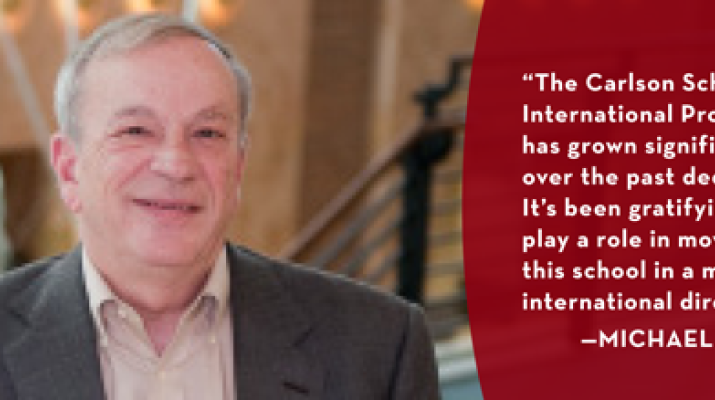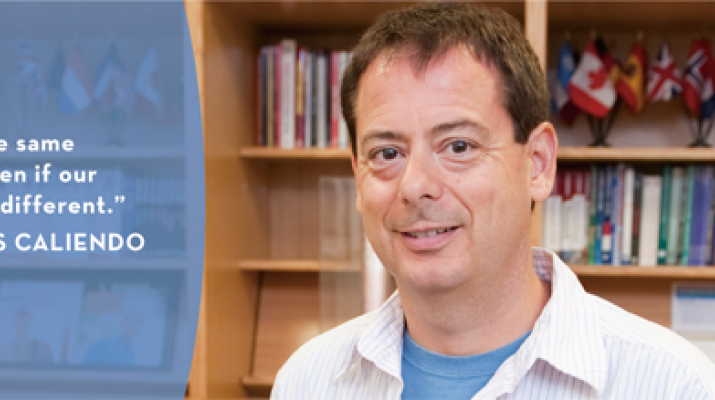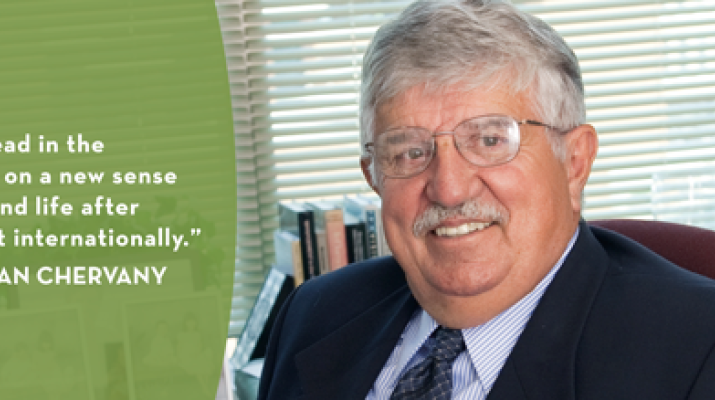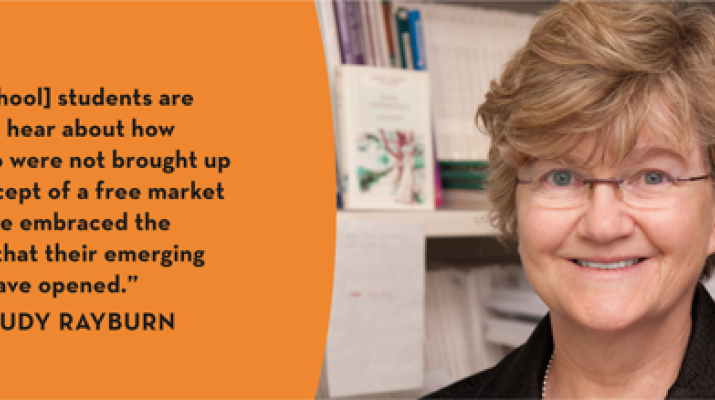
Global Lessons
Wednesday, September 1, 2010
By Sarah Gilbert Frederick
Participation in the Carlson School’s International Programs is an opportunity for faculty members to teach—and learn—abroad.
There are many reasons why Carlson School faculty members agree to teach courses in the institution’s growing number of international programs. And there are a wide variety of reasons why they decide to continue traveling year after year. Most faculty members, however, all report something similar about working abroad: It changes their careers and perspectives on business, teaching, and the world in general.
The opportunity to teach at one of the Carlson School’s three Global Executive MBA programs (in Warsaw, Poland; Vienna, Austria; and Guangzhou, China) or to take part in any of the numerous other international programs has a profound impact on faculty. That impact is then shared with students both here and abroad. “I bring much of what I’ve learned into the classroom,” says Charles Caliendo, a senior accounting lecturer. “It has definitely changed the way I teach.”

"The Carlson School's International Programs area has grown significantly over the past decade. It's been gratifying to play a role in moving this school in a more international direction."
Michael Houston: International Trailblazer
Michael Houston, associate dean of International Programs and Ecolab-Pierson Grieve Chair in International Marketing, was in the right position at the right time to play a key role in the development of the Carlson School’s global efforts. Houston, who started his career at the University in 1986, became the associate dean of Faculty and Research in 1992 and started working with the director of International Programs. When the opportunity to partner with the Warsaw School of Economics arose shortly thereafter, he helped develop the first Global Executive MBA program—and took a role as an instructor in the program. “Based on that, my professional interests shifted more to the international realm,” Houston says. “I began shifting my teaching and research interests to the international area.”
Houston had always been interested in consumer behavior; after his international experience, he became particularly interested in how consumers behaved differently in different parts of the world. As more American companies began marketing products and services globally, understanding what mattered to people in different cultures became increasingly important. Houston’s career shifted to focus more on those issues as well. “The international activities I’ve been involved with have had a profound influence on me,” he says.
Houston’s commitment to international activities has continued to grow. “The Carlson School’s International Programs area has grown significantly over the past decade,” he says. “It’s been gratifying to play a role in moving this school in a more international direction.”

"We have the same concerns, even if our cultures are different."
Charles Caliendo: Unexpected Traveler
Charles Caliendo had barely been outside of the United States when Michael Houston asked if he was interested in teaching a course for the Carlson School’s Executive MBA program in Vienna in 2001. Then 30 years old, his travels had taken him only as far as Canada. But going abroad seemed exciting, so he agreed to try it.
Now Caliendo, a senior lecturer in accounting, travels overseas between eight and 10 times a year—and sometimes as often as once a month. He teaches in Vienna, Warsaw, and Guangzhou. He takes a group of undergraduate accounting students to Argentina each year, and last year he went for the first time to Africa.
Everywhere he’s been, he’s learned more about how much people really are the same. “We have the same concerns, even if our cultures are different,” he says. “We want to raise our families, to have healthy kids—we’re all the same.”
With a few small differences, actually: Caliendo was surprised by how well prepared and eager his Vienna students were; once they even asked him to continue teaching at the end of a 10-hour class session. “They aren’t accustomed to paying for education,” he explains. “So when they shell out money, they demand results. They soak it all up.”
Their attitude refreshed Caliendo’s approach to teaching. “I expect more from my students now,” he says. “I treat them more like my Vienna students, and I set high expectations for all of them.”

"What you read in the papers takes on a new sense of vibrancy and life after you've taught internationally."
Norman Chervany: Citizen of the World
When Poland’s president, Lech Kaczynski, and his wife were among 97 people killed in an airplane crash last April, Norm Chervany sat down to write an email to his friends in Warsaw. “It was a tragic loss—and if I hadn’t spent time in Poland, then that’s probably all I would have thought,” says Chervany, a professor of information and decision sciences who has been teaching in the Warsaw Executive MBA program for 15 years. “But having been there, and knowing how serious the Polish people are about their government, their leaders, and voting, it took on a new light and had a much greater meaning.”
Chervany was in Warsaw as Poland changed from communism to a democratically run nation. He and his students at the Warsaw School of Economics experienced that transformation first-hand. During his first trip to Poland, he recalls that it was hard to find an English-speaking clerk at a department store—much less a new shirt. Now, Chervany says, the stores are bustling with goods and shoppers.
His experiences in Warsaw, and in Austria and China as well, opened his eyes to the similarities—and differences—of people and businesses all over the world. Although his students share many characteristics and face many of the same marketing, technology, and strategy issues, the differences in their economic and political situations add another dimension. “Those nuances are different enough to bring you new insight and give you pause to think about it,” Chervany says.
Chervany finds himself thinking about those differences even when he’s home in Minnesota. “What you read in the papers takes on a new sense of vibrancy and life after you’ve taught internationally,” he says.

"[Carlson School] students are interested to hear about how students who were not brought up with the concept of free market economy have embraced the possibilities that their emerging economies have opened."
Judy Rayburn: Global Perspectives
Since 2002, Professor Judy Rayburn, chair of the Department of Accounting, has taught introductory financial accounting in the Warsaw and China Executive MBA (WEMBA and CHEMBA) programs each three times. And each time, she’s come away feeling more impressed.
“On our first visit to China, my husband, Gene, and I were startled when two tightly regimented rows of six-year-old children shouted ‘hello’ to us on a busy street in Beijing,” she says. “They were obviously proud of their proficiency in English.”
She was just as impressed with the students in her classes. “I loved teaching them far more than I expected,” she says. “I was profoundly moved by the students’ hope and struggle to adapt to their changing environment. They face issues that go way beyond the grades they will receive in the classroom. They worry about their parents—many of whom do not fit in the new economic system—at the same time that they dream about a better future.”
Rayburn has found that the level of internationalization of China and Eastern Europe is way ahead of that in the Midwestern United States, so she often discusses the vibrant economies of these places in her classes. “[Carlson School] students are interested to hear about how students who were not brought up with the concept of a free market economy have embraced the possibilities that their emerging economies have opened,” she says.
Teaching abroad has provided Rayburn with perspectives that she tries to instill in her students back at home. “I vigorously encourage Carlson School students to learn all they can from their required international experience,” she says. “It will help them realize the nature of the globally competitive environment we all face.”
She also has found lessons that apply to her own discipline. “Teaching in CHEMBA and WEMBA has convinced me that the United States needs to adopt International Financial Accounting Standards (IFRS),” she says. “Poland, China, and more than 100 other countries around the world have adopted IFRS.”